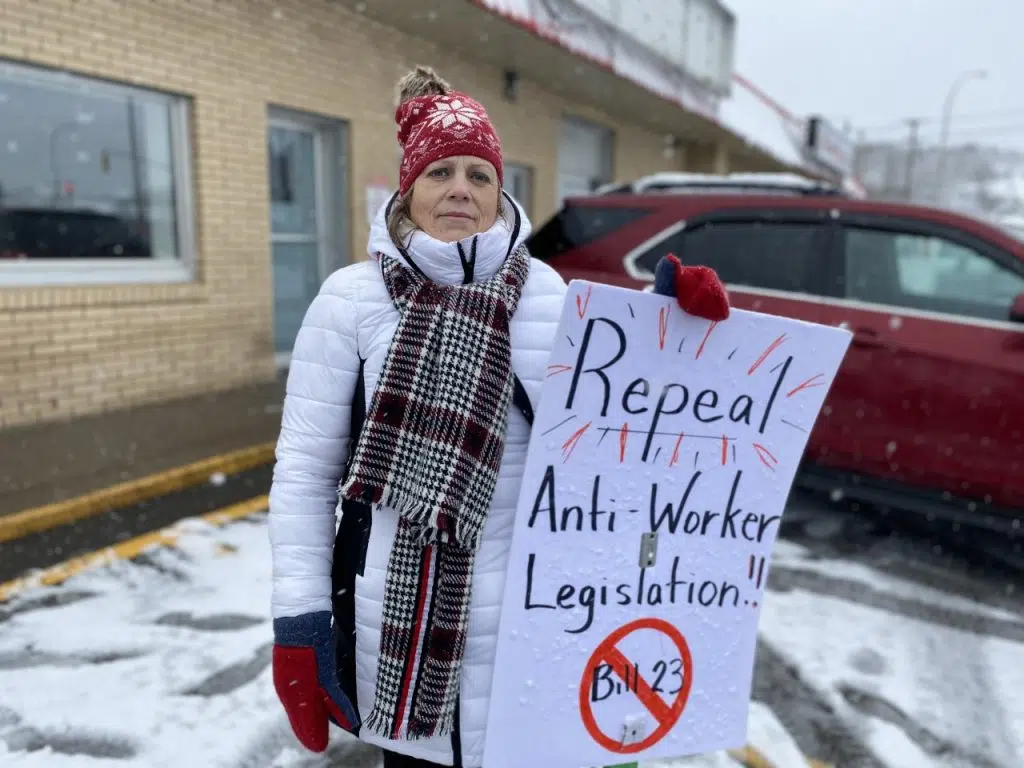Labour leaders in New Brunswick are pushing back against controversial labour legislation that recently came into effect.
Protests were held Monday in Saint John, Moncton and Fredericton over Bill 23, which received Royal Assent on Friday.
The bill makes several amendments to the province’s Public Service Labour Relations Act which unions say unfairly favour the government.
Sandy Harding, regional director of CUPE Maritimes, said the changes will make collective bargaining much harder for public sector workers.
“It is going to lead to further labour unrest, further disrespect of labour from this government, and ultimately more problems with recruitment and retention in the public service,” said Harding.
Harding was one of roughly two dozen people who protested in front of Labour Minister Trevor Holder’s constituency office in Saint John.
Similar rallies were also held at the offices of Progressive Conservative MLAs Ernie Steeves and Jill Green. They were organized by the New Brunswick Federation of Labour, its affiliate unions, and Unifor.
“The labour movement will not sit quietly while Premier Blaine Higgs passes legislation that strips rights away from the hard-working people of this province,” said Daniel Legere, president of the New Brunswick Federation of Labour.

Sandy Harding is the regional director of CUPE Maritimes. Image: Brad Perry
Among the changes included in Bill 23, public sector employers are able to use so-called “scab” workers during a strike or lockout to replace designated essential workers who are absent.
Unions now have to give a 72-hour strike notice while lockouts by the employer require 24 hours notice. Before now, no notice was required by either side.
The amendments also update what an arbitrator must consider if both the union and employer agree to binding arbitration.
Harding said the government failed to consult with the unions and ignored their request to pause the changes so meaningful discussions could happen.
“There was zero response to that and they couldn’t really answer our questions,” she said. “They come back to this line that it’s about clarity. In fact, this makes things way less clear, so that’s not a goal.”
Labour Minister Trevor Holder has maintained that the changes are meant to “promote balance” by ensuring bargaining units can take action during a labour dispute while essential services are maintained.
But none of the unions who attended Monday’s rallies saw the changes as promoting balance. In fact, they believe the balance is being tipped in favour of the employer.
Harding said union leaders in both the public and private sectors are considering their next options.
“We’re looking into a constitutional challenge. We definitely believe there are elements of this that are unconstitutional,” she said.
About two dozen union members protested Bill 23 in front of Labour Minister Trevor Holder’s #SaintJohn office today.
Among other things, the legislation — which received royal assent Friday — allows public sector employers to use so-called “scab” workers in a strike or lockout. pic.twitter.com/5q9cpPJ1Tp
— Brad Perry (he/him) (@BradMPerry) December 19, 2022






Comments